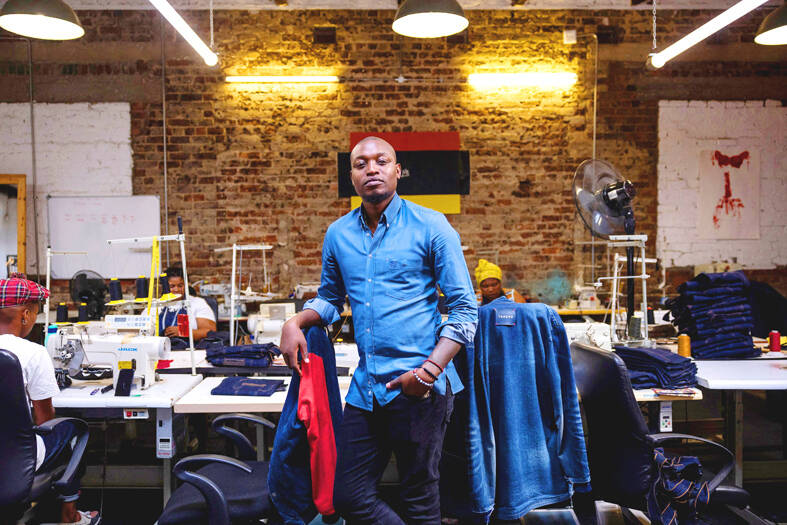Growing up in a township outside Johannesburg, Tshepo Mohlala was mocked for wearing skinny jeans before they were popular.
More than a decade later, ridicule has turned into admiration as the 32-year-old is now a successful fashion designer making denim praised by global celebrities including Beyonce and Meghan Markle.
“The township was never ready for my sense of style,” he said, sitting in his atelier in a trendy redeveloped industrial building in Johannesburg.

Photo: AFP
The South African entrepreneur has made a name for himself in the past few years with tailor-made jeans targeting African women who, poorly served by Western brands, struggled to find a perfect fit.
“A whole lot of African women have a tiny waist and big booties, and big hips and tiny legs,” said Mohlala, a slender man with close-cropped hair and a goatee framing a broad smile.
“We created a range of jeans using raw denim with no stretch that is super tailored for women,” he said.

Photo: AFP
Before they were clients, women were a source of inspiration for Mohlala. The logo of Tshepo Jeans, his firm, is a stylised crown with three spikes representing the three women who marked his life. His mother taught him resourcefulness, his grandmother taught him to behave like a gentleman and a stylish aunt introduced him to fashion.
Later, when he was short of money and forced to drop out of fashion school, it was a fourth woman he was dating who helped him set up his business in 2015.
“She was like: ‘Yo, dude, listen, I see you’re obsessed with this thing, here is access to 8,000 [rand] and go ahead and start your business,’” Mohlala said. “I took that loan and went to buy myself some fabric and created the first range of jeans.”
The line got traction as he cleverly advertised it on social media, creating anticipation — “Something big is coming” — and telling his own story.
Now about 10 tailors sew away behind large windows under the high ceiling of his workshop. Tshepo Jeans’ top-range denim is made from cotton produced in neighboring Zimbabwe, which is then sent to a mill in Japan before being cut and assembled back in Johannesburg.
Many local customers like a light denim “with a bit of stretch” that is “comfortable” and “breathable,” making it well suited for the hot African weather, Mohlala said.
Personalized pairs sell for about US$375, the equivalent of 7,128 rand, just less than it cost Mohlala to start his business.
Orders come from all over the world.
In 2019, the brand got a massive boost from Meghan Markle, who bought a pair during a trip to the continent.
“A lot of South Africans at the time would say: ‘Why would I buy Tshepo?’ and then you have the Duchess of Sussex coming here, really calling me and begging: ‘I need to get a pair of jeans from you before I leave the country,’” Mohlala said.
A year later, US pop star Beyonce listed Tshepo Jeans among brands she admired.
“Celebrity endorsement has really helped build our brand and opened up doors for us on a global scale,” Mohlala said.
“He is winning hearts abroad and in South Africa,” said denim fanatic Thando Made, who runs a fashion blog about jeans.
“Denim is like religion: You choose the one that works for you,” Made said. “In this space that Tshepo is in, he speaks to somebody who wants to embody the pride of being South African.”

Nauru has started selling passports to fund climate action, but is so far struggling to attract new citizens to the low-lying, largely barren island in the Pacific Ocean. Nauru, one of the world’s smallest nations, has a novel plan to fund its fight against climate change by selling so-called “Golden Passports.” Selling for US$105,000 each, Nauru plans to drum up more than US$5 million in the first year of the “climate resilience citizenship” program. Almost six months after the scheme opened in February, Nauru has so far approved just six applications — covering two families and four individuals. Despite the slow start —

North Korean troops have started removing propaganda loudspeakers used to blare unsettling noises along the border, South Korea’s military said on Saturday, days after Seoul’s new administration dismantled ones on its side of the frontier. The two countries had already halted propaganda broadcasts along the demilitarized zone, Seoul’s military said in June after the election of South Korean President Lee Jae-myung, who is seeking to ease tensions with Pyongyang. The South Korean Ministry of National Defense on Monday last week said it had begun removing loudspeakers from its side of the border as “a practical measure aimed at helping ease

DEADLY TASTE TEST: Erin Patterson tried to kill her estranged husband three times, police said in one of the major claims not heard during her initial trial Australia’s recently convicted mushroom murderer also tried to poison her husband with bolognese pasta and chicken korma curry, according to testimony aired yesterday after a suppression order lapsed. Home cook Erin Patterson was found guilty last month of murdering her husband’s parents and elderly aunt in 2023, lacing their beef Wellington lunch with lethal death cap mushrooms. A series of potentially damning allegations about Patterson’s behavior in the lead-up to the meal were withheld from the jury to give the mother-of-two a fair trial. Supreme Court Justice Christopher Beale yesterday rejected an application to keep these allegations secret. Patterson tried to kill her

CORRUPTION PROBE: ‘I apologize for causing concern to the people, even though I am someone insignificant,’ Kim Keon-hee said ahead of questioning by prosecutors The wife of South Korea’s ousted former president Yoon Suk-yeol yesterday was questioned by a special prosecutor as investigators expanded a probe into suspicions of stock manipulation, bribery and interference in political party nominations. The investigation into Kim Keon-hee is one of three separate special prosecutor probes launched by the government targeting the presidency of Yoon, who was removed from office in April and rearrested last month over his brief imposition of martial law on Dec. 3 last year. The incident came during a seemingly routine standoff with the opposition, who he described as “anti-state” forces abusing their legislative majority to obstruct